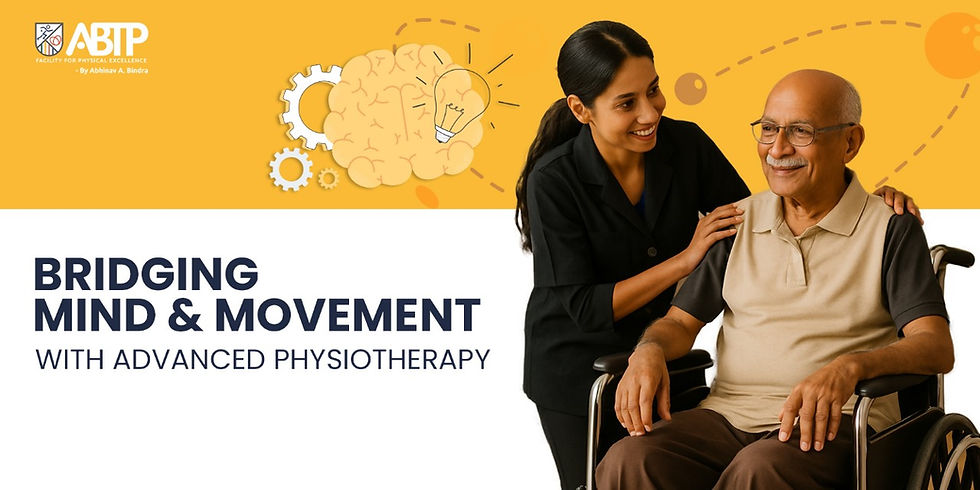Advanced Physiotherapy: Transforming Neurological Recovery at ABTP
- ishneen
- Jul 11, 2025
- 3 min read
When trapped in the heart of a relentless thunderstorm with no way out, that feeling of helplessness can leave an individual overwhelmed, directionless, and struggling to find a way back home.
In a similar manner, living with a neurological disease can also seem like getting stuck in an unending rain. Carrying the weight of neurological conditions like recovering from a stroke, managing the complexities of Parkinson’s disease, or coping with multiple sclerosis—all this remains an exhausting experience with no end to the struggle in sight.
But even in the darkest tunnels, there is always a ray of hope—and advanced physiotherapy at ABTP stands as a powerful ally during these challenging times. It not only accelerates the path to recovery but also helps improve overall quality of life.

In this blog, let’s explore how innovative physiotherapy techniques are truly transforming lives.
Neurological diseases affect the brain, spinal cord, nerves and this disrupts the body's movements causing abnormal sensations and even function. In neurological conditions like stroke, Parkinson's, MS, or traumatic brain injury, one can experience muscle weakness, coordination issue, spasticity, or even difficulty in thinking. These symptoms not only compromise physical functioning but sometimes also reduce independence, confidence, and mental well-being.
Traditional treatments of these ailments are usually dependent on medication or surgery, but rehabilitation has emerged as a key to holistic care.
Not "exercising" or "stretching," advanced physiotherapy is science based treatment specifically aimed at the specific requirements of each patient, restoring control and re-establishing lives.
Advanced Physiotherapy Creating a Difference

Advanced physiotherapy for neurology at ABTP is all about precision, innovation and profound understanding the nervous system.
HERE ARE WAYS, WE TRANSFORM THE RECOVERY JOURNEY
NEUROPLASTICITY - BASED REHABILITATION Through carefully designed exercises, therapists activate specific neural pathways, helping the brain “relearn” lost movements or functions. Constraint-Induced Movement Therapy (CIMT), is a technique which encourages stroke survivors to use their weaker limb by restricting the stronger one. This stimulates new brain connections and fosters recovery.

ROBOT ASSISTED THERAPY Robotic equipment further provides precise, repetitive motion that helps re-educate nerves and muscles. These tools are especially beneficial for patients with mobility impairments. These offer continuous support without increasing the risk of injury. This therapy seems like experiencing a sci-fi movie. This has a futuristic feel, which makes the healing experience more engaging and motivating.
FUNCTIONAL ELECTRIC STIMULATION (FES) It uses low-level electrical currents to activate paralyzed or weakened muscles caused by neurological damage. FES can improve walking patterns, reduce spasticity, and enhance strength by mimicking natural muscle contractions. It has been a game-changer for individuals with conditions like multiple sclerosis (MS) or spinal cord injuries, helping them regain greater independence in their daily activities.

TASK-SPECIFIC TRAINING Neurological recovery isn’t just about moving—it's about moving with purpose.
Task-specific training focuses on everyday activities like picking up a cup or climbing stairs. It is practiced in a controlled setting; this training helps patients build strength, coordination, and confidence that seamlessly carry over into daily life.

TRAINING THROUGH VIRTUAL REALITY
By incorporating virtual reality (VR) into physical training for patients with neurological disorders, we at ABTP aim to enhance motor skills, coordination, and overall engagement. The immersive nature of VR keeps patients focused and motivated. VR-based tasks basically stimulate the brain’s neuroplasticity and encourage the formation of new neural pathways. This further helps 'retrain' the nervous system and restores lost functions.
WHY ADVANCED PHYSIOTHERAPY AT ABTP?
At ABTP, we understand that no two neurological conditions are alike, nor are the individuals who are suffering from them. Our professionals assess a patient's individual requirements, goals, and limitations, and subsequently devise a plan that adapts as the patient makes progress in the recovery journey. From blending hands-on approaches and cutting-edge technology to even supporting the holistic well-being of the patient, we at ABTP address the neurological conditions in a way that the patient feels stronger and better.
Advanced physiotherapy is not just about bringing symptom relief but it's about helping the patient reclaim possibilities. With the help of neuroplasticity, advanced technology, and personalized care, individuals with neurological conditions are being empowered to move better, feel stronger, and live fuller lives. If you're living with one of these conditions, take comfort in knowing that a world of progressive, supportive care is ready to help you take the next step forward.








Comments